- Home
- Michael Crichton
Venom Business Page 7
Venom Business Read online
Page 7
He turned to the girl seated behind him and said in French, “Tired?”
“A little.”
“What’s your name?”
“Dominique,”
She seemed bored. Her face was blank and expressionless. Pierce came back, got into the car, and said, “All right. Off we go.”
Twenty minutes later, they arrived at the George Cinq. They got out, and Raynaud gave the doorman the keys. Walking into the lobby, Raynaud noticed that Pierce had a slight limp. “What happened?”
Pierce smiled. “An experience worthy of you,” he said. “It was a girl with a knife, two years ago. Slashed my leg in bed.” He smiled. “She wasn’t going for the leg.”
“Lucky,” Raynaud said.
“I suppose.”
They got into the elevator. Pierce said, “I’m in room one ninety-three. Why don’t you call me in the morning? We must go out on the town together. We simply must,” he said, patting Dominique’s bottom. “There is so much to see and do here.”
Raynaud nodded.
“Call,” Pierce said, “any time after noon.” The elevator stopped, and Raynaud got out. Pierce was staying one floor above.
“Sleep well,” Pierce said, and grinned.
The doors closed.
Raynaud walked down the hall to his room, unlocked it, and went inside. A girl was there, sitting in a chair, smoking a cigarette.
“Who are you?” he said.
“Vivienne.”
“What are you doing here?”
She was a beautiful girl with a slim, taut body and dark red hair.
“I bring you the compliments of—”
“I know,” Raynaud said. In a sense, he had expected it. He held the door open. “You want room one ninety-three.”
The girl frowned. “No, I was told—”
“Room one ninety-three,” Raynaud repeated.
Looking confused and uncertain, she picked up her purse and sauntered to the door. There she stopped and put her hand over Raynaud’s, giving him a questioning glance.
“Room one ninety-three,” he said firmly.
She shrugged, and left.
When he was alone, he undressed and wondered if he had done the right thing. Pierce might be annoyed. On the other hand, it might be expected. The old Charles Raynaud of college days would be pleased but resentful at such a present. Perhaps Pierce was testing.
Testing what? he wondered.
He picked up the telephone and dialed swiftly. A voice answered on the tenth ring.
“Merde, alors.”
“I am calling back about a dead man,” Raynaud said, “who is not dead.”
“Oh, yes. For a thousand francs.”
“That’s correct.”
“The dead man has been located,” the voice said. “Do you know me?”
“Yes. We have done business before.”
“Then you will find me at Saint-Lazare tomorrow at ten. The café across from the Métro station. Bring the money.”
The phone was dead. He smiled and replaced it in the cradle.
Then he lay down to sleep, feeling much, much better about everything.
Richard Pierce awoke irritably. He was cramped and cold. Looking over, he saw that the two girls had pulled all the blankets to their side; he was naked from the waist up.
Angrily, he pulled the blankets back. The girls stirred, and opened their eyes.
“Hello,” said Dominique, the blonde. Her voice was soft and sleepy.
“I thought I told you to be gone when I woke up,” Pierce said.
She said nothing, but pouted, looking hurt.
“Get out,” Pierce said.
The girls stared at him. Particularly the redhead, Vivienne.
“Go on, don’t just lie there. Get out!”
They were frightened now. They scrambled out of bed. Without pleasure, he watched their naked bodies as they dressed. His head was throbbing: champagne. Houghty’s hideous, horse-piss champagne. Always gives you a head the morning after.
The girls finished dressing and began to comb their hair.
“Forget it,” he said. “Get out.”
They stopped and went to the door, where they paused.
“Well, what are you waiting for? The manager will pay you.”
They left.
Damned girls. He had told them quite distinctly to be gone in the morning. He hated to wake up and find girls in his bed; it disgusted him. Especially girls like these. They looked fine in the evening, but the next day, with the makeup smeared, their faces pale…
Hideous. Like witches.
He reached for his watch on the bedtable. Eleven o’clock. Jesus Christ, eleven o’clock. No wonder he felt like hell. He rolled over and tried to sleep again, but he was too angry, and his head hurt too much. He swore, and got up.
He looked at the bed. Christ: stiff stains on the sheets, curly hair, streaks of mascara and makeup on the pillows. It looked like hell. He went to the phone and called room service. He wanted a maid to change his bed. The voice at the other end was soothing.
“Now! Change it now!” he shouted, and slammed the phone down.
Stupid frogs. No damned idea about running hotels. Did they think he wanted to come out of a shower and look at that? That lousy stinking, greasy bed.
They were dirty people. Everybody said it, the French were a dirty people. It was true.
Damn it. Eighty dollars a day for this suite. What was he paying for, anyway. The right to have his sheets changed when he wanted it. A little service, that was all.
He went into the bathroom, ran the sink full of cold water, and dunked his face in. The water was a shock, but it cleared his head. He pulled it out, dripping, and stared into the mirror.
“You look like a piece of shit,” he said.
Then he got into the shower.
At thirty-four Richard Pierce was worth almost as much as any single man in England. His father—his adopted father—was Herbert Edgar Pierce, the man who had built the Pierce empire of tea and rubber plantations in Burma and Malaya in the early part of the century. Most of that was now gone, of course, taken away in successive waves of nationalization. But there were still the copper mines in Australia; they now provided the major income from the estate. And, of course, all the other holdings.
Pierce remembered little of his true parents. They were named Trevor-Carter; his father had long been a friend of Herbert Pierce. When Trevor-Carter and his wife were killed in a German bombing raid on London in 1940, Richard was adopted by Herbert. At the time, Richard was six years old, and had been sent to the country to live while the war continued. He rarely saw his adopted father until he was ten, and the war ended.
He got along wonderfully with his father and spent several happy years, until the marriage with Lucienne. Almost overnight, that marriage changed everything.
Lucienne Ginoux was a French singer, living in London. She had become famous during the war, a favorite with the troops, particularly the thousands of Americans who had been massed in southern England before the Normandy invasion. She was tall, aristocratic, beautiful, and nearly forty. She was also a bitch.
For as long as Richard could remember, his father treated him well, and his stepmother treated him badly. As a young boy, he was conscious of an almost visible hate emanating from her, a hate which he did not understand, but soon responded to in kind.
He also hated her for what she did to his father. At the time of their marriage, Herbert was fifty-eight, a man in his prime, wealthy and successful. There were rumors of an impending knighthood, of a high government position. The marriage to Lucienne abruptly ended those rumors. It was widely acknowledged that Herbert had married badly, and there was nothing to be done; the threat of scandal was too great.
Richard remembered that his adopted parents fought a great deal, because his mother kept having affairs, and his father didn’t like it. When he was seventeen, Richard went up from Eton, where he was a mediocre student, to Queen’s College, Cam
bridge. He was accepted only because the college needed money, and they hoped that Herbert Pierce might make a considerable donation.
Richard was unhappy at Queen’s. He was sent down after two years, spent some time in London, and then went to Yale. Things were better there; he made several friends, and for the first time in his life, he felt at home. The separation from his family helped. However, eventually the rounds of parties and drinking bouts became too much. He flunked out after two years.
From America he went to Geneva. Soon after he arrived, his father died in an automobile accident, under rather mysterious circumstances. Richard immediately quit. He never did anything serious again in his life.
After the funeral, he made an arrangement with his mother. It was a polite arrangement, and the essence of it, though unspoken, was clear: Richard would be given a substantial allowance for the next ten years, until he inherited the estate. In return, he would avoid Lucienne as much as possible.
The arrangement worked well. Richard was able to travel, to indulge himself with fast cars, exotic food, and erotic women. Recently, however, his spending had increased. He had had several fights with his mother about money. To avoid the fights, and to humor her generally, he had agreed to marry. For him, it was purely a delaying maneuver. When he reached thirty-four years and two months, he would inherit the estate, and Lucienne would no longer be trustee.
Then he would dump the Italian girl and cut Lucienne off without a penny.
That prospect gave him considerable pleasure.
After his shower, he came out to find that the bed was made, the room tidied. He looked around: his martini was not there.
Damn.
He called room service. “Why hasn’t my martini been brought?”
“We have no record of an order, sir.”
“Of course you have a record. Look around. And get a martini up here immediately.”
He slammed down the phone. Incompetent frogs. The only decent thing about the country was the women. Without the women, France would be a desert.
Just a few crappy cathedrals.
Minutes later, a boy arrived with the martini.
“I’ve told you people before,” Pierce said, “that I want a cold, very dry vodka martini here every day at noon. I want to wake up and find it waiting. Understand?”
“Yes,” the boy said.
“Good.”
He gave him twenty francs, dismissed him, and sat down with his drink. It was good; cold and burning. He lit a cigarette and wondered what he would do for the evening.
Then he remembered Raynaud.
Now there was a stroke of luck. Imagine, running into the lad again, after all these years. Such perfect timing. It was almost too good.
He picked up the phone and called Raynaud’s room.
“Hello?” Raynaud said.
“Sorry if I woke you,” Pierce said.
“No, no. I’ve been up awhile.”
“Where’ve you been?” Pierce said.
“To the bank. A little business.”
“Any plans for tonight?”
“No.”
“How about this afternoon?”
“Well, actually, I thought I’d take a walk.”
“You have a car, don’t you?” Pierce said.
“Yes, but I feel like walking.”
“In Paris? Your feet’ll be covered in dogshit.” He laughed. “How about tonight? Want to make an evening?”
“Sure.”
“Drinks at six? In the bar, here?”
“You’re on,” Raynaud said.
“Good, good. See you then.”
Pierce hung up and sipped his drink. He had a few arrangements to make. He picked up the phone again and made several calls.
5. INFORMATION
CHARLES RAYNAUD HAD ARISEN early, gone to the bank, and transferred Houghton Graham’s money to his own account, using a bank draft. It was a relatively simple transaction, even for a French bank, and it took just a few minutes. Then he had gone to Saint-Lazare and the Café Royal, opposite the steps leading down to the Métro station.
He had arrived at nine-thirty, intending to be early. He wanted to watch Mantini arrive. The old Italian had been, in his day, a superb thief, and he was not above a few sly moves in his old age.
Precisely at nine-fifty-five Mantini came strolling up the street. Wearing a blazer and carrying a cane, he looked like a cheap imitation of Chevalier, but his step was light and his eyes beneath the cap were darting and watchful as he surveyed the crowd sitting at the sidewalk tables.
He stopped when he saw Raynaud.
For a moment he looked puzzled, then he bowed slightly and sat down at the table with him.
“Merde, alors,” he said. “So it was you, after all.”
“Yes.”
Mantini smiled. “It has been a long time, Charles.”
“Only four years.”
Mantini had helped him once, in Rome. The Count Ramazzi had accepted a gold-inlaid Pre-Columbian piece from Guatemala and then, quite blandly, had refused to pay Raynaud. The Count had, in fact, offered to call the police if Raynaud did not leave immediately.
Four days later, it was Mantini, aged but agile, who had slipped into the villa north of Rome and taken the piece back, leaving behind a neatly wrapped sack of horse droppings. Then he had deftly picked the lock of the safe behind the Dufy on the west wall of the study, removing the two fifty million lire which the Count Ramazzi had failed to bank, and consequently, to pay taxes on. For this, Mantini had graciously accepted fifty percent of the take.
“Only four years?” Mantini said. “It seems longer.”
“No.”
“It seems like centuries,” Mantini said. “How did you know I was living in Paris?”
“I heard,” Raynaud said.
“And did you also hear about Arriz? I swear, I thought he was dead. There were rumors that the guardia civil had finally caught him. On the border, at Hendaye.”
“I know. I heard the same rumors. But as it turned out, I saw Arriz.”
“Oh? Where?”
“Orly.”
Mantini chuckled. “So you were the one. I heard that someone had released some snakes, and caused a commotion….” He sighed. “I should have known it was you. Arriz will be grateful.”
“He better be,” Raynaud said.
“I have his address,” Mantini said. “But it was difficult.”
“We agreed on a thousand francs.”
“It was difficult,” Mantini repeated.
“A bargain. We are old friends.”
“I am old, you are not. It was difficult and costly to obtain the information.”
Raynaud sighed. “How much?”
“Five thousand.”
“No.”
“Ah, my friend. Then we cannot do business.” Raynaud signaled to the waiter to bring coffee, then turned his attention to the street. He watched a pretty girl in a very short skirt stride past. In the current fashion, the girl wore a pale transparent blouse and no bra.
“Two thousand,” he said.
“She is delightful,” Mantini said. “If only I were younger. Four and a half.”
“Her breasts are small. Two thousand five.”
“But what do you think of the one coming? The redhead? Four thousand.”
“Bitchy.”
“Nonsense. She is an angel. She has gentle eyes. Four thousand.”
“She would screw you if she could.”
“Let us pray,” sighed Mantini, lighting a cigar.
“Three thousand.”
“You are very difficult, Charles. Do you not find her ass charming?”
“No. I said, three thousand.”
“I heard you.”
Mantini sat back in his chair and smiled slightly as he smoked the cigar. His eyes were on the street. “I am getting older each minute. Soon, I will no longer even watch.”
“You’ll watch until you die,” Raynaud said.
“I fear the
day I stop watching,” Mantini said, “as I once feared the day….Four thousand.”
“You’re stubborn. Three thousand.”
“Three-eight.”
“Three flat. My best offer.”
“I had forgotten, Charles, how nasty you Americans are. Three-five. I barely cover expenses.”
“Three flat,” Raynaud repeated. “It cannot be more.”
“Robber,” Mantini said, puffing the cigar. “Bastard.”
“Three flat.”
“Three-five.” He smiled. “Still in the same business?”
“No.”
“Something different?”
“On occasion.”
“Killing people?”
“No, as it happens.”
“I always thought,” Mantini said, “that you had the potential to kill. I mean it as a compliment.”
“Three flat,” Raynaud said.
“Do you like the blonde that is coming? She has a most delicate waist.”
Raynaud sighed. “All right,” he said. “I give in. I can’t take any more. Three and a quarter.”
“Three-five.”
“Three-four.”
Mantini set his cigar down in the Cinzano ashtray. “Sold,” he said. Raynaud nodded, and watched the blonde.
“Rue Ambrose Bierce,” Mantini said. “Apartment nineteen, third floor. Knock four times: one-two-three-pause, and then four. You understand?”
“I understand,” Raynaud said, reaching into his pocket for the money.
The blonde sauntered past, aware of eyes upon her, swinging her hips in a saucy, delightful way.
“What is it?”
Raynaud stared at the man at the door. He was nothing much, unless your taste ran to pale young men with plucked eyebrows who were dressed in tight, black leather pants and a black leather shirt cut open to the waist.
“I want to see Arriz.”
“Arriz is dead.”
“Tell him it is Charles. He knows me.”
“Arriz,” the leather boy said, arching one delicate eyebrow, “is dead.”
“Tell him,” Raynaud repeated. “Or I will break your neck.”
Leather-boy hesitated, so Raynaud stepped forward quickly, swinging his right arm stiffly, catching the boy in the neck just below the cartilages. He fell back and tumbled to the ground, clutching his neck and making choking sounds. Raynaud stepped into the room.

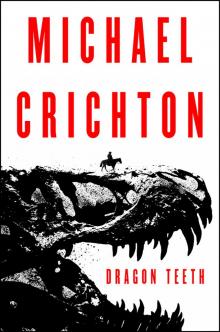 Dragon Teeth
Dragon Teeth Jurassic Park
Jurassic Park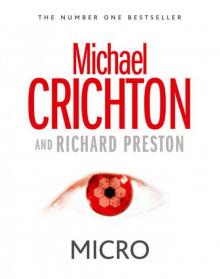 Micro
Micro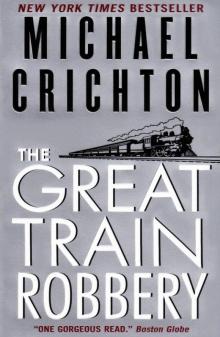 The Great Train Robbery
The Great Train Robbery The Andromeda Strain
The Andromeda Strain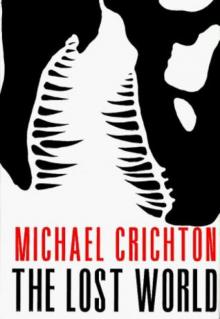 The Lost World
The Lost World Congo
Congo Travels
Travels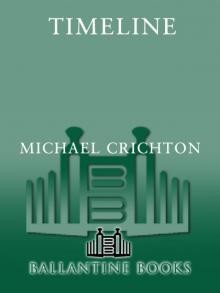 Timeline
Timeline Sphere
Sphere Westworld
Westworld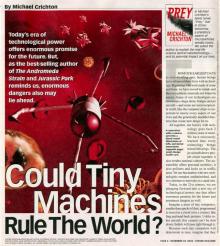 Prey
Prey State Of Fear
State Of Fear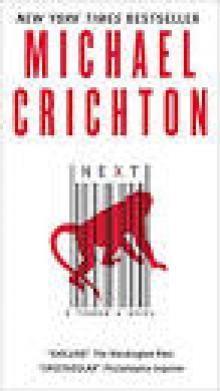 Next
Next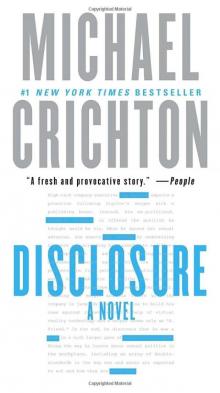 Disclosure
Disclosure Pirate Latitudes
Pirate Latitudes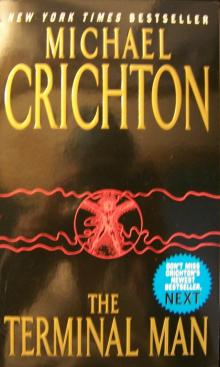 The Terminal Man
The Terminal Man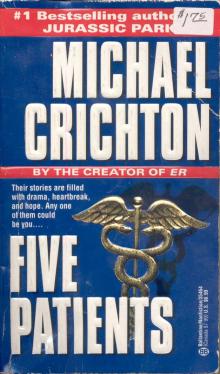 Five Patients
Five Patients Rising Sun
Rising Sun Binary
Binary The Andromeda Evolution
The Andromeda Evolution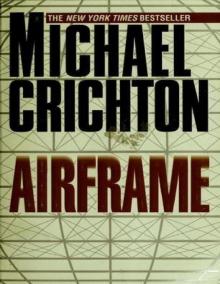 Airframe
Airframe Easy Go
Easy Go Drug of Choice
Drug of Choice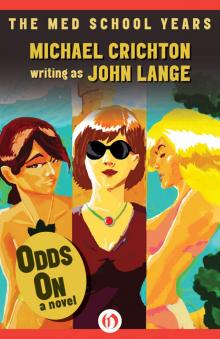 Odds On: A Novel
Odds On: A Novel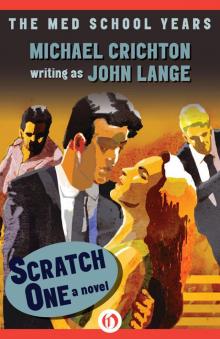 Scratch One
Scratch One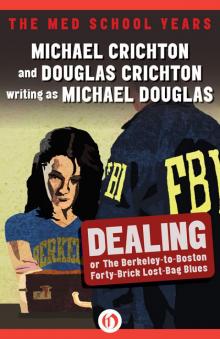 Dealing or The Berkeley-to-Boston Forty-Brick Lost-Bag Blues
Dealing or The Berkeley-to-Boston Forty-Brick Lost-Bag Blues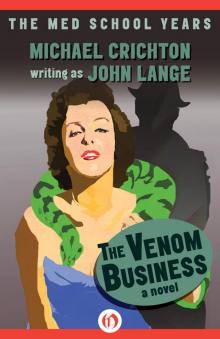 Venom Business
Venom Business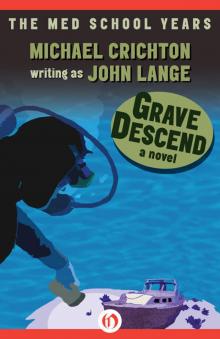 Grave Descend
Grave Descend Gold - Pirate Latitudes
Gold - Pirate Latitudes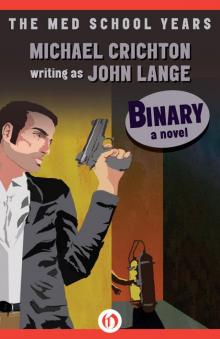 Binary: A Novel
Binary: A Novel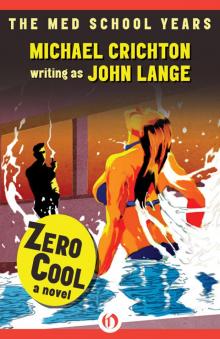 Zero Cool
Zero Cool Delos 1 - Westworld
Delos 1 - Westworld